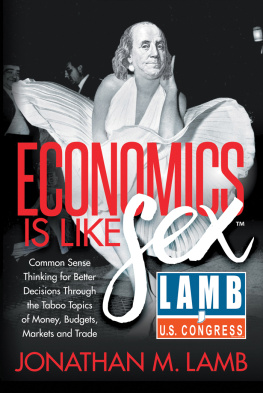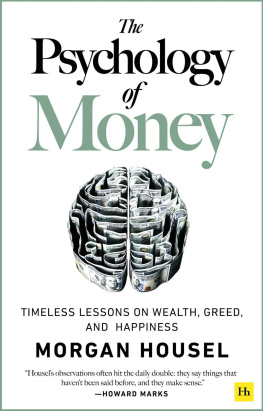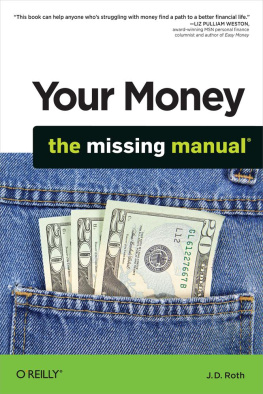Swift Reads
Insights on Morgan Housels The Psychology of Money
First published by Swift Books LLC 2020
Copyright 2020 by Swift Reads
All rights reserved. No part of this publication may be reproduced, stored or transmitted in any form or by any means, electronic, mechanical, photocopying, recording, scanning, or otherwise without written permission from the publisher. It is illegal to copy this book, post it to a website, or distribute it by any other means without permission.
First edition
This book was professionally typeset on Reedsy
Find out more at reedsy.com
Insights from Chapter 1
#1
Peoples experiences, their upbringing, their status, and other factors shape their view of the world and how it functions. All experiences and views are different.
#2
Some lessons have to be experienced before they can be understood. You can try to understand others situations, but you cannot really get it unless you go through it yourself.
#3
People should make investment decisions based on their goals and the characteristics of the investment options available to them at the time. However, economists have found that peoples investment decisions are heavily anchored to their experiences in their own generation.
#4
People from different backgrounds have different experiences. They see the world differently. They have different ideas about what money is and how it should be used. Opinions on lottery tickets and sweatshops are prime examples of differing views.
#5
People who dont have a lot of money are more likely to buy a lottery ticket than people who do have a lot of money, because it is the only way they can dream of achieving a financially comfortable life.
#6
The modern foundation of money decisions such as saving and investing is based around concepts that are still new, which explains why so many people are not good at managing finances.
Insights from Chapter 2
#1
Bill Gates is incredibly smart, very hardworking, and as a teenager had a vision for computers that even most trained computer executives could not understand. He was also lucky enough to be able to attend Lakeside School, which had a computer.
#2
Luck and risk are both the reality that guides every outcome in life. But both are so hard to measure, and hard to accept, that they too often go overlooked. Respecting them helps you realize that judging financial success is never as good or as bad as it seems.
#3
When judging others, attributing success to luck makes you look jealous and mean, even if luck is known to exist. When judging yourself, attributing success to luck can be too demoralizing to accept.
#4
Identifying the traits we should emulate or avoid in successful people is hard to do. Learning by imitating others is not a way to success.
#5
Many fortunes are based on leverage and overworking employees. The line between boldness and recklessness is very thin and can easily be crossed, only to be realized in hindsight.
#6
Risk and luck are doppelgangers. The difficulty in identifying what is luck, what is skill, and what is risk is one of the biggest problems faced when trying to learn about the best way to manage money.
#7
Be careful who you praise and admire. Be careful who you look down upon and wish to avoid becoming.
#8
Focus less on specific individuals and case studies and more on broad patterns. Studying specific people is dangerous because the focus tends to fall on extreme individuals.
#9
When successful, realize that things are not as good as you think. When you fail, do not think your decisions were terrible when sometimes they just reflect the unforgiving realities of risk.
Insights from Chapter 3
#1
Enough entails blurred limits in todays society, and not having enough has its own dangers.
#2
Rajat Gupta, a wealthy businessman born into poverty, committed fraud to gain quick and easy money. He ended up in prison, his previous business success destroyed by his thirst for riches. Bernie Madoff followed a similar fraudulent path and ended up in jail.
#3
Rich people commit fraud to get money they didnt have and didnt need. Always remember that you dont need to risk what you have and need for what you dont have and dont need.
#4
The hardest financial skill is getting the goalpost to stop moving. Manage your expectations and dont constantly strive for more.
#5
You must accept that you might have enough and not compare yourself to others.
#6
Enough is not too little. An insatiable hunger for more will lead to eventual regret.
#7
Things like family, reputation, happiness, freedom, and independence are never worth risking, no matter the gain.
Insights from Chapter 4
#1
You dont need tremendous force to create tremendous results. Even something small can lead to something big.
#2
Warren Buffett is the richest investor ever, and his success comes from the long time he spent investing. He started small at a very young age and continued accumulating relatively small annual gains. He only retired when he turned 60. This period is the key to his riches. This technique is called compounding.
#3
The counter-intuitiveness of compounding may be responsible for many financial disappointments. Investing isnt about earning the highest returns in a short period of time. Its about earning good returns that can be repeated over a longer period of time.
Insights from Chapter 5
#1
Theres only one way to stay wealthy: a combination of frugality and paranoia.
#2
Getting money requires taking risks, being optimistic, and putting yourself out there. But keeping money requires the opposite of taking risk: humility, fear, and frugality. It requires survival. Compounding is key to survival.
#3
You should want to be financially unbreakable more than wanting to earn big returns. If youre unbreakable, you will then earn the biggest returns because you will be able to stick around long enough for compounding to do its job over a longer period of time.
#4
Planning is important, but the most important part of every plan is to plan on the plan not going according to plan.
#5
You should adopt a barbelled personality: one where you remain optimistic about the future but keep a certain level of paranoia about the obstacles that might hurdle your plans.
Insights from Chapter 6
#1
The farthest ends of a distribution of outcomes, known as long tails, have a big influence in finance. In other words, a small number of events can account for the majority of outcomes.
#2
Most things that are huge, profitable, and famous are the result of a tail event. It is a rare and powerful occurrence, and it applies to large public stocks as well as venture capital.
#3
The idea that a few things account for most results is not just true for companies in your investment portfolio. Its also an important part of your own behavior as an investor.
#4
An investing genius is a man or woman who can do the average thing when all those around them are going crazy.
#5
In business, investing, and finance, most things go wrong, break, fail, or fall. Its normal.
Insights from Chapter 7
#1
We all want to be happy. Happiness is complicated, but it has a shared universal element: having control of ones life.
#2
Reactance is when people feel disempowered to do certain tasks because they are being imposed on them by someone else rather than by their own choice.









